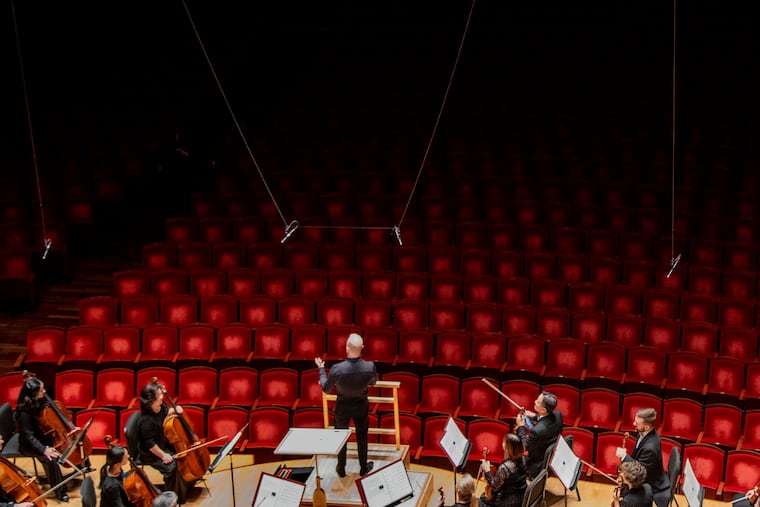Coronavirus forced the Philadelphia Orchestra to play to an empty house. And I was there to witness it
On a long, bad day, here was a solution that allowed the orchestra to be heard,

The Philadelphia Orchestra was never meant for an audience of one — or few. That’s why the Philadelphia Orchestra’s audience-less Thursday concert felt like a parallel universe.
You had the familiar orchestra musicians in full concert dress, music director Yannick Nézet-Séguin, and the beloved Beethoven Symphonies Nos. 5 and 6. Except different.
On Thursday afternoon, the Philadelphia Orchestra canceled all of its events through March 23 due to the health concerns that are shutting down large public gatherings of all sorts.
The concert’s Plan B, which fell into place that same day, had the performance going forward to a nearly empty house, streamed on the orchestra’s website (though a snafu put it in Facebook Live) and recorded for WRTI radio broadcasts on 2 p.m. Friday and 1 p.m. Sunday. There will also be a WHYY-TV telecast at some later date.
Outside the hall, a few patrons who didn’t get the news were gently, tactfully turned away by Kimmel Center personnel. The few people present in the hall — including myself and visitors from the Bravo! Vail Music Festival, where the orchestra plays every summer — were asked not to applaud because such meager clapping would sound pallid to listeners tuning in from elsewhere.
But for those who were there, it was confounding to have the orchestra standing to receive phantom applause that wasn’t there. This was not a dress rehearsal, but the real deal. And it was also a reminder of the gravity of the situation.
The atmosphere, though, was hardly grave. It had been a long day with developments everywhere in the performing arts — most of New York was shut down, the world premiere of Philip Glass’ The White Lama was postponed at Philadelphia’s Annenberg Center, and at Milan’s La Scala, a prominent former employee died. Here was a solution that allowed the orchestra to be heard.
For all of its magisterial image, the Philadelphia Orchestra isn’t easily unnerved, thanks to history of foreign touring under highly changeable circumstances. Of all the composers, it’s Beethoven who has been there for the public through centuries of hardship, Nézet-Séguin said in a spoken introduction to the concert: “And we’re still inspired.”
“We rehearsed the program … we were gearing up to play it," first associate concertmaster Juliette Kang told me at intermission after playing Beethoven’s 5th.
"We had to play it. It was an artistic imperative from the inside,” Kang said. “The emotional whirlwind everybody’s in, it came through in the piece. It did for me. I could feel that struggle in the Beethoven.”
“Though the hall was empty, I could feel trembling inside of me,” said concertmaster David Kim.
Composer Iman Habibi, seated 20 seats away from me on the main floor of Verizon Hall (the Vail contingent was in an upper tier), is among several emerging composers commissioned by the orchestra to write short companion pieces to the Beethoven symphonies for the season’s thwarted BeethovenNOW series.
He may be among the few to hear his piece, Jeder Baum spricht, which addresses global warming with the kind of nature-inspired, big-orchestra sonorities that can be delivered by an ensemble of Philadelphia’s caliber.
“But I don’t know if you can count this as a premiere,” he said. (With a worldwide audience on Facebook, radio, and TV, the answer is most likely “yes.”)
Internet chatter praised the orchestra for maintaining its presence — along with criticisms that the musicians were at risk just from being together. There’s an edge of covert panic out there, and you can almost feel the struggle between people’s sense of hope and fear.
On the hope front ..:
At the Metropolitan Opera, where Nézet-Séguin was supposed to open a new production of Massenet’s Werther on Monday, star Joyce DiDonato was at least able to offer comfort via Twitter (@JoyceDiDonato) to the children’s chorus members who were reportedly “heartbroken” that performances are canceled. “I understand that heartbreak,” she said. “But there WILL be more opportunities.”
Also on Twitter, pianist Igor Levit (@igorpianist) vowed to stream performance videos from his home every day at 7 p.m. Central European Time. The Berlin Philharmonic played a streamed concert from an audience-less hall on Thursday afternoon, including Berio’s Sinfonia, whose choral contingent embeds the words “Martin Luther King” into the orchestral texture.
In Philadelphia, Beethoven boomed, growled, and stormed with exceptional urgency. Yet this was not the kind of end-of-the-world Beethoven heard from European radio archives when empires were crumbling during World War II. Nor was there the hopelessness felt at the Philadelphia Orchestra’s post 9/11 concert at the Mann Center in 2001.
The current adversary is an invisible virus, not a fallen hero or an act of war. Thursday’s concert had exceptional momentum, as if to say, “We will get through this.”
Beethoven’s usually genial Symphony No. 6 (“Pastoral”) had higher peaks of tension and release than usual, with an aggression in the third-movement peasant dances that led more logically than usual into the storm scene that followed — as if Nézet-Séguin conducted it as an opera without words.
Principal bassist Hal Robinson described the concert as being “medicinal” and wasn’t the only player who said Thursday that they would love to have the other canceled Beethoven concerts streamed and broadcast.
Word from the orchestra administration: We’ll see.